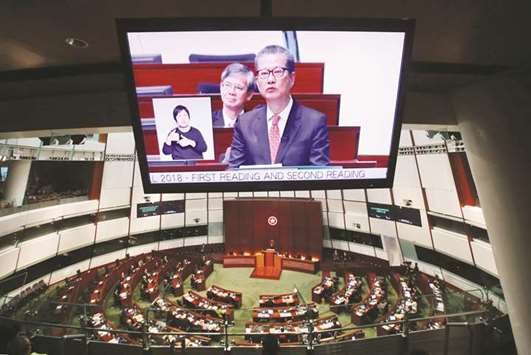Hong Kong rolled out tax cuts, relief measures and capital spending in an expansionary budget yesterday, after the city racked up a hefty budget surplus, targeting investments in high-technology industries to help raise its competitiveness.
Financial secretary Paul Chan unveiled measures to address economic challenges and longstanding livelihood strains in the former British colony, including a gaping wealth gap and lofty property prices.
Hong Kong posted a provisional budget surplus of HK$138bn ($17.63bn) for the 2017/18 financial year and expects an overall surplus over the next five years, Chan said.
The economy also expanded 3.8% in 2017 – the fastest in six years – boosted by a buoyant property market, improved tourism and financial services.
Overall expenditure for 2018/19 will increase 17.6% over the previous year to HK$557.9bn ($71.3bn) in one of the most expansionary budgets in recent years, Chan said.
More than HK$50bn ($6.4bn) would be earmarked for “investing in the future”, Chan said, who described the priorities as a “new fiscal philosophy” of forward-looking and strategic capital spending to help innovative and creative industries, including a start-up fund and investments in sectors such as fintech, biotechnology and artificial intelligence.
Despite this, the city has retained a sizeable war chest with fiscal reserves expected to eclipse the HK$1tn mark at the end of March 2018.
Hong Kong has long been seen to be lagging far behind the new industry push of rivals such as Singapore and the southern China tech hub of Shenzhen, home to goliaths like Tencent Holdings and Huawei.
“The current-term government is ready to think out of the box and act proactively to open up new horizons for Hong Kong,” Chan said in a nearly two hour speech to lawmakers, as small groups of protesters outside the legislature demanded greater cash handouts, as well as more affordable public housing and a more equitable pension scheme.
“The budget this year gets a higher score than the previous one as it appears that the government is more willing to invest for the future of Hong Kong,” said Thomas Shik, acting chief economist of Hang Seng Bank, but he added it remains to be seen if the new measures would be well received by the people.
Hong Kong’s economy grew 3.4% in the fourth quarter from a year earlier, and was up a seasonally adjusted 0.8% from the third, Chan said.
GDP this year is expected to grow 3%-4%, Chan added, saying he was cautiously optimistic with robust global economic growth expected to benefit the trade-dependent city, and China’s stabilising economy should spill over into the financial hub, even amid structural reforms.
Six economists surveyed by Reuters expected fourth quarter growth of 3.2% from a year earlier, down from 3.6% in the July-September quarter.
The economists did not provide quarterly forecasts.
Chan sees the red-hot property market coming under pressure as more flats hit the market and as interest rates are expected to rise.
He did not announce any immediate measures to put a lid on rocketing prices but warned buyers to assess the risk.
Hong Kong’s home prices have surged for 15 straight months despite repeated cooling measures, further exacerbating public discontent towards housing affordability in the city of 7.4mn.
“Hong Kong has been plagued by land shortage for years.
The problem not only affects people’s livelihood, but also restrains our growth potential.
We must proactively address this problem with firm resolve,” Chan said.
He said that 20,800 private residential units would be completed annually over the next five years, an increase of some 50% over annual private flat additions in recent years.
Salaries and profits tax cuts worth HK$25.5bn for the 2017/18 year would be given, capped at HK$30,000 per taxpayer.
A 13.3% increase on annual spending on healthcare was also earmarked to help an efficient, highly subsidised yet occasionally over-burdened public health system.

Hong Kong financial secretary Paul Chan delivers the annual budget at the Legislative Council yesterday. Hong Kong posted a provisional budget surplus of HK$138bn ($17.63bn) for the 2017/18 financial year and expects an overall surplus over the next five years, Chan said.
